Quartodecimans InSabbatani Waldenses Sabbath Passover Wednesday Crucifixion Daniel 9
Here are some writings preserved of the Quartodecimans accusing the non-Quartodecimans of innovating and changing the original Christian faith. They also accused them of following the pagan customs and the Roman emperor. Here are some examples of their writings:
Polycrates of Ephesus was a bishop and a Quartodeciman leader who wrote a letter to Pope Victor I in 190 AD, defending his practice of celebrating Passover on the 14th of Nisan. He claimed that he was following the tradition of the apostles John and Philip, and that he was not afraid of the threats of excommunication from Rome. He also said that the non-Quartodecimans were “weavers of lies” who had “forsaken the truth”.
Melito of Sardis was a bishop and a Quartodeciman apologist who wrote a treatise called On Pascha, which is ONE OF THE EARLIEST Christian commentaries on the Passover. He argued that the Passover was fulfilled by Christ, who was the true Lamb of God. He also criticized the non-Quartodecimans for celebrating Easter on a different date than the Jews, and for following the “error of the nations” and the “decree of Caesar."
The Didascalia Apostolorum is a Christian legal treatise that claims to be written by the Twelve Apostles, but is actually a later composition from the 3rd or 4th century. It deals with various aspects of church practice, such as baptism, fasting, ordination, and liturgy. It is based on the earlier Didache, and was later incorporated into the Apostolic Constitutions. It states that Jesus and his disciples ate the Passover on the third day of the week (Tuesday) at evening, and that Jesus was arrested later that night. The Didascalia Apostolorum also accuses the non-Quartodecimans of being “deceived by the scribes and Pharisees” and of “transgressing the commandment of God”.
I put more weight into Quartodecimans like Polycarp and others over so called "church fathers" who kept Easter and other practices not found in the bible.
From everything I understand they kept Sabbath too. I reject the catholic traditions 99% or more people keep today. And I found this, the writings of Epiphanius of Salamis where he notes that some Christians celebrated the resurrection on the seventh day of the week (Saturday), following the Jewish reckoning of time. Here is an excerpt from his work Anacephalaeosis, which is a summary of his Panarion:
"And the first day of the week is the day of the resurrection, which is also called the Lord’s day. But some of the sects, who are called Quartodecimans, celebrate the resurrection on the seventh day of the week, which is also the Sabbath, according to the Jewish reckoning of time. For they say that the Lord rose on the Sabbath, and not on the first day of the week, as it is written in the Gospel. And they are called Quartodecimans, because they keep the Passover on the fourteenth day of the first month, which is Nisan, according to the Law."
Therefore, I see no reason to believe in the nonsense people try to feed me when they say, "Jesus got it wrong when he said He would be in the grave 3 DAYS and 3 NIGHTS, He was only in the grave 2 nights." No, Jesus is not a false prophet like you make Him out to be. The Bible does not have errors.
These "sects" that Salamis is referring to actually got it right. The things the Quartodecimans observe are found in the Bible, we see the early believers observing these things in the Bible. The thing we do not see is catholic traditions like Easter Sunday in the bible being celebrated. We also do not see weekly gatherings on Sunday, but we do see many weekly gatherings on Sabbath.
Why would I even start to believe the traditions of man, when they are not in the Bible?
Quartodecimans were excommunicated, exiled, tortured, or killed for their beliefs and practices. Their writings have pretty much been wiped from existence.
Sort of reminds you of groups like the Waldenses who ejected some of the Catholic doctrines and sacraments, such as the papal authority, the indulgences, the purgatory, and the prayers for the dead. They also translated and studied the Bible in their own language, and preached without the permission of the Church. The Waldenses were condemned and hunted by the Catholic Church and the secular authorities, who tried to exterminate them by various means, such as crusades, inquisitions, massacres, and expulsions.
Now, most of us would think it is wrong for Christians to torture someone else for their beliefs and practices, especially if they beliefs and practices do not seem to be breaking any moral laws. Yet we find one group of so called "christians" doing that to another group of christians called "quartodecimans".
Just let that sink in, who might the real christians be? The murderers or the ones being murdered?
Facts about the Insabbatati:
They were also called the Vaudois, the Poor of Lyon, or simply Christians.
They originated in the 12th century, either from a rich merchant named Peter Waldo, or from an earlier group of Christians who lived in the Alpine valleys.
They shared the teachings of the Bible in the common language of the people, and insisted on the Bible as their only rule of doctrine and life.
They rejected the doctrine of purgatory, the Mass, the use of holy water, ashes, candles, kissing of relics, and the celebration of papal festivals.
They were persecuted by the Catholic Church as heretics, and fled to various regions of Europe, spreading their biblical teachings.
They were considered precursors of the Protestant Reformation by some historians.
Seems that they may have also kept the yearly Passover, and commemorated the death of Christ on the 14th of Nisan, the day of the Jewish Passover, like the Quartodecimans.
They still exist today as a small denomination, mostly in Italy.
-
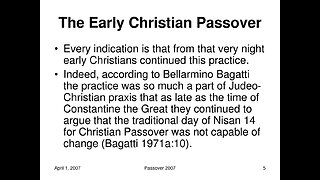 2:33:47
2:33:47
TheProtestantView
4 months agoSabbath and Passover discussion - NO PROOF it was Changed or Done Away with
1582 -
 1:42:48
1:42:48
The Dance of Life Podcast with Tudor Alexander
2 months agoTHE SABBATH #6: How the Crucifixion Reveals the Sabbath
226 -
 35:24
35:24
PreachingInPyjamas
4 months ago2nd Sunday after Epiphany Year B Sermon
6 -
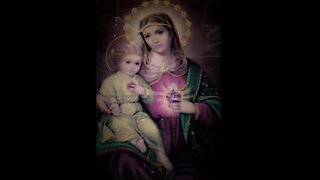 23:55
23:55
Sancta Sedes Apostolica - The Holy Apostolic See
1 month agoSermon of His Holiness Pope Jacobus I on 4th Dominica in Pascha...28 April, 2024 AD
14 -
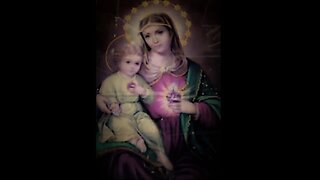 36:46
36:46
Sancta Sedes Apostolica - The Holy Apostolic See
1 month agoDecree of the Holy See on the new versions of the Apostolic Constitution Sacramentum Ordinis...11 April, 2024 AD
28 -
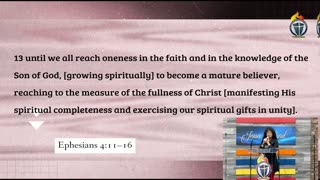 1:30:51
1:30:51
HandinHandwithGodTv
3 months agoJOICC Bible Study/Communion Service || February 7, 2024
29 -
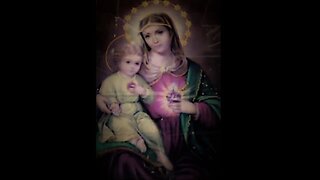 48:20
48:20
Sancta Sedes Apostolica - The Holy Apostolic See
2 months agoHow God fulfills His promise to protect His Catholic Church against the devil...1 April, 2024 AD
51 -
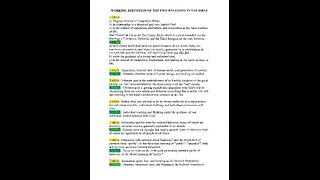 1:50:08
1:50:08
BartBaconshereticalBibleclass
3 months ago41st session. 1-3-24. FUNDAMENTALS OF READING THE BIBLE
1092 -
 3:37
3:37
Afriend4lif
2 months agoSt Thomas Aquinas' Lenten Meditation - Thursday After the 1st Sunday of Lent
18 -
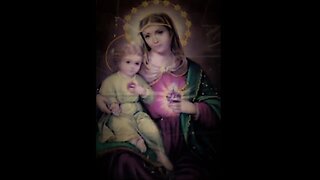 24:53
24:53
Sancta Sedes Apostolica - The Holy Apostolic See
1 month agoSermon of His Holiness Pope Jacobus I on 2nd Dominica in Pascha...14 April, 2024 AD
30